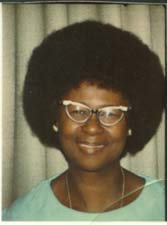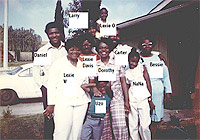
Historical Society, MSP 3800
Born: Sep 22, 1909
Died: Nov 18, 1978
Lexie Davis’ life story is like a painter’s canvas with a number of vibrant splashes of color. Some of the splashes are large and colorful. You see the imprint. Others are small, almost undetectable. But there are many, many areas with no color. These are the areas of personal history that I do not know – and may never know – about my aunt and about my mother, her only living sister.
Aunt Lexie left no children. We have few pictures. Her inheritance was given to the family of the man to whom she was still married, but from whom she had been separated for over 20 years. There are few outward signs that my aunt ever lived. I feel cheated. Because of my aunt’s involvement in Peoples Temple and death in Jonestown, her legacy has been destroyed and the original purpose of her life aborted.
Lexie Smith Davis was the closest relative that I knew from my mother’s side. My daughter and my sister are named after her. They had one brother, Charles, whom I met once. When Aunt Lexie left for Guyana, Uncle Charles ceased all contact with my mother although she sought diligently to find him. My mother missed her sister until the day that she herself died. I feel the emotion of “missing” her because I know that not knowing her means that there are things about my background and about myself that are forever lost.

My mom and her sister, Aunt Lexie, were physically quite different. Their childhoods are shrouded in mystery. They probably had different fathers. From what I can gather, there were six children, including mom, Aunt Lexie and Uncle Charles. Aunt Lizie (Elizabeth) died at an early age. She was accidentally hit in the head while playing with several teenage friends. My Uncle Jim (or perhaps it was Uncle Robert) died in a fight. I found both Robert and Jim on one census record on a genealogical website, but neither was listed 10 years later with other family members. Charles, the youngest brother, was wounded in WW II, lost a leg, and lived with my aunt until she left for Guyana. I have no idea when or if he has died.
Here are some things that I remember about my aunt, the splashes of color I do have. The first splash is a memory of the fruit cake that she had delivered to the house for Christmas. It was my first time I ever tasted such a delicacy, and even now is the reason I like fruit cake. It opened my world up a bit. You see, I grew up in the south, without TV for part of my childhood. There were no fast food restaurants – Mom always cooked – and a fruit cake seemed like a real treat.
I also remember a trip Aunt Lexie made to Beaumont. She wore a mink stole and had a suitcase that became an obsession with me. I had to look inside it. I did and got in trouble as a result. But I remember feeling that she belonged to a world that was so much more glamorous that the one that I lived in.
Another splash was a memory of a trip I took to California when I was a teenager. I visited Aunt Lexie in a small apartment in Los Angeles where she lived with Uncle Charles and perhaps a man friend whom I never met. Charles was friendlier and reached out to me. We rode the bus to downtown Los Angeles, where he bought me a stuffed toy puppy with a radio inside. Aunt Lexie was private, and I did not feel as comfortable around her as I did with Uncle Charles.
My brother John wrote a few years ago that he remembered coats that Aunt Lexie sent to him and our brother Carter. “She bought Carter and me matching coats. Carter was about 9, and I was about 5 at the time.”
In the early 70’s Aunt Lexie became heavily involved with Jim Jones but still maintained telephone contact with my mother. In the middle 70’s, my sister Lexie says that Aunt Lexie sent for her to come to California to live. At that time, Jim Jones assigned Aunt Lexie patrol duty that required that she walk the perimeter of the property beginning late at night. One night my aunt woke up my sister to go with her. Sensing danger – or perhaps just an uneasiness – Lexie refused and made arrangements to leave Los Angeles right away to stay with our brother in San Diego. Now she attributes her uneasiness to our mother’s prayers.
In many ways I am ashamed of my aunt’s involvement in Jonestown. I sense the question that many people want to ask: “Why didn’t you persuade your aunt not to go?” The simple answer is that we tried but couldn’t.
At what point do you remove the power of choice from an adult even if you sense danger or imminent death? This is a question I often wrestle with, and not just as it relates to my aunt or other Temple members who went to Guyana. I have tried to commit individuals who can be judged insane by most. The courts still have a process that must be followed. Unfortunately, that process and stretch of time can be dangerous for all involved. I have sensed issues with decisions made by loved ones that have hurt or could eventually hurt them.
But I also know my aunt was not insane. She rejected our values, but she had the power to make that choice, even though it led to her death. Mother tried to entice Aunt Lexie to leave the Temple and return to Texas. Mother was instinctual and saw future problems with Jim Jones and his movement, but all of our efforts to get Aunt Lexie to leave him ended in failure.
I can’t say for sure how old my aunt was when she died. I know the records show that she was born on September 22, 1909 and died on November 18, 1978 – the day that will live in “infamy” – but even the date of her birth is shrouded in mystery. We always believed that she was at least five years older than Dad, who was born June 28, 1907, but Aunt Lexie never really showed (or talked about) her true age. Her mother – my grandmother who died before I was born – was married to Richard Smith in 1910. Grandmother Rosie (or Rosa) was 15 at the time. We believed that Aunt Lexie was born earlier than 1900. It is also possible that she was the daughter of Richard Smith from a previous marriage or relationship, which would have meant she was Rosie’s stepdaughter. It is another one of those “areas with no color.”
Aunt Lexie probably first got married in the 1920s and divorced shortly thereafter in Jasper, Texas. She was married at least twice, but the husband whose last name was “Davis” was her last spouse.
I do know that Lexie Davis was a “seeker” who wanted to experience more of life that what our mundane existence in Texas offered. It could have been the dullness of our lives that sparked the friction between my aunt and my father. She was beautiful and slim (most of her life), colorful and sophisticated. Her dress, speech and manners were devoid of the influence of Jasper. My mom was overweight, dark and rather plain.
I would describe our family life as conservative and boring. I could tell the clock from my father’s habits. He rose at 5 AM and was out of the door at 7. He came home at 5 and wanted a cup of coffee to drink while he read the newspaper, then sat down to watch the evening news with Walter Cronkite. During the week he went to meetings of his union, the NAACP, his lodge, or church. On Saturdays, he prepared for Sunday school. On Sundays we went to Sunday school, church, and BTU (Baptist Training Union) and evening service. Between church and BTU, we ate a large Sunday dinner. During the week, my mom came home at the same time and cooked either spaghetti, fried chicken, beans, and on rare occasions ribs. We had desserts two or three times a week. We cleaned on Saturdays. Our lives revolved around church, school activities, community groups, and each other.
But while our lives had a rhythm, the world was changing.
The end of World War II marked a shift in what was acceptable. While Daddy was content to talk about the issues of the day and to join the union and NAACP, people of my generation were being prepared to die for freedom. We joined organization like the Beaumont United Freedom Fighters and the Student Non Violent Coordinating Committee. We practiced passive, nonviolent resistance – that meant going limp – during the inevitable arrests as the result of sit-ins. We did not view life as worth living if we were forced to maintain the status quo of separate water fountains, inadequate schools and separate but unequal facilities and neighborhoods. Progressive people of all colors smelled blood and the chance to change the system.
The change started out in the context of nonviolence and what God would do (as we knew him from traditional theology). I cannot identify the catalyst but something happened along the way with the result that traditional values and thinking about family, God and Jesus gave way to “seeking” a society that did not rely on a Saviour outside of ourselves. We sought to construct our own sex lives, family commitment, and community using our sense of right and wrong or neutral. For example, Aunt Lexie talked of God and appeared much “holier” – maybe more “spiritual” is a better way of putting it – than my mom, who herself was the president of the traditional Baptist Ladies Missionary Society and a very good woman. Lexie followed a man who was not only charismatic but who performed miracles. Later, she talked of the creation of a society, though devoid of the traditions of Christian doctrine, practiced what we could not achieve in the outside world. Outside of Jim Jones, Black people were judged by their color. We were judged inferior and we were not accepted as “beautifully and wonderfully made” too. But outside of Jim Jones, the world was also adapting a plan to divorce itself from the restrictions of plain, traditional families like the one I was in, headed by my “boring” mom and dad.
Since Jonestown, we have seen further erosions of “family values.” The refrain of “We shall overcome” has died. In its place we hear rap lyrics that demean Black women, calling us “ho’s.” Standard morality now seems to be that it is perfectly acceptable to live together, and if you aren’t pregnant or had children prior to the ceremony (if any such ceremony is planned), then you’ve been smart and wise. My aunt died because she chose to move to Guyana “seeking” to create a utopian, classless, society that carved out its own set of moral standards, not limited to or constrained by Christian values. Her quest ended in a tragedy. The rest of us stayed home, but I am not sure if we have not done the same thing. We must wait to see what the end will be.
(Dorothy Brooks’ other article in the jonestown report is here. She can be reached at dlbrooks9@verizon.net.)